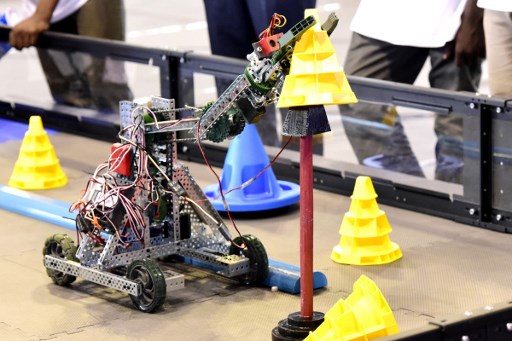The Nigerian Content Development and Monitoring Board (NCDMB) sponsored a 16-week STEM training program focused on robotics, culminating in a competition among nine secondary schools from Edo, Delta, Bayelsa, and Rivers states. Ozolua Grammar School, Ologbo, Edo State, emerged victorious, demonstrating the program’s success in fostering innovation and technical skills among Nigerian youth. The program, themed “Robotics for a Sustainable and Inclusive Skilled Economy,” aimed to equip students with practical robotics experience while promoting creativity and problem-solving abilities, key attributes for the 21st-century workforce. This initiative underscores the growing recognition of STEM education’s importance in driving economic development and preparing future generations for a technology-driven world.
The collaborative effort, facilitated by Contego Servo, Odyssey Educational Foundation, and Phoenix Girls Tech Foundation, reflects a concerted push to enhance the quality of education in Nigeria. Dr. Elizabeth Eterigho, CEO of Phoenix Girls and Tech Foundation, emphasized that robotics serves as a catalyst for innovation and critical thinking, essential skills for navigating the evolving job market. The program’s success highlights the potential of Nigerian youth to contribute meaningfully to a technology-driven economy when provided with the necessary resources and opportunities. The competition showcased not just technical proficiency but also the students’ ability to apply their knowledge creatively, demonstrating the transformative power of STEM education.
The 16-week program culminated in a grand finale held in Effurun, Delta State, where the participating schools presented their robotics projects. These projects served as tangible evidence of the students’ learning journey, showcasing their ability to design, build, and program robots. Ozolua Grammar School’s victory is a testament to their dedication and the effectiveness of the training program in nurturing their talents. The other participating schools also demonstrated commendable skills and innovation, with Iwere Secondary School, Koko, and Nana Model College, Warri, securing second and third place, respectively. The competition fostered a spirit of healthy competition while simultaneously highlighting the collective growth and achievement of all participants.
The NCDMB’s sponsorship of the program underscores its commitment to developing local talent and fostering a sustainable and inclusive skilled economy. Mr. Weyinmi Ebiyon, representing the NCDMB, emphasized the program’s alignment with national goals for educational advancement. The board’s investment in STEM education signifies a strategic approach to equipping Nigerian youth with the skills needed to contribute to the nation’s economic growth and competitiveness in a globalized world. The collaboration between government agencies, educational foundations, and private sector organizations demonstrates a shared vision for empowering the next generation through quality STEM education.
Mrs. Rose Ezewu, Delta State Commissioner for Basic and Secondary Education, commended the initiative and expressed the state government’s interest in expanding similar programs. This commitment signifies the growing recognition of robotics and STEM education as crucial components of a modern curriculum. By providing students with hands-on experience and exposure to cutting-edge technologies, these programs prepare them for future careers in fields such as engineering, computer science, and robotics. The success of the NCDMB-sponsored program serves as a model for other states and organizations seeking to invest in the development of STEM talent.
Mr. Okoh Isaac, a teacher from Ozolua Grammar School, expressed gratitude for the opportunity and called for increased government investment in technology education. His sentiment reflects a broader understanding of technology’s transformative potential and the need to equip students with the skills to thrive in a rapidly evolving technological landscape. The success of Ozolua Grammar School and the other participating schools underscores the importance of providing access to quality STEM education across Nigeria. The program’s impact extends beyond individual student achievement, demonstrating the potential for STEM education to drive economic growth, innovation, and societal progress. The collaboration between government, private sector, and educational institutions exemplifies a collective effort to prepare Nigeria’s youth for the future.


